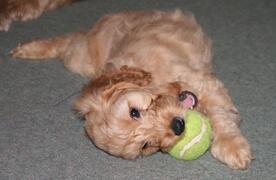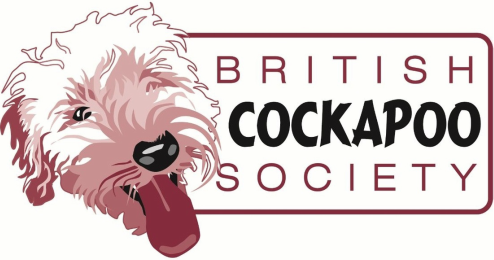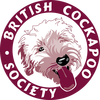TEETHING & BITE INHIBITION

OUCH!!! That's really the only word to describe this stage of your pups development, and it is a phase that often causes problems for puppy owning families.
Unfortunately is is more or less 100% guaranteed that at some time or other your puppy will go from the gentle, cuddly, friendly little chap to a horror who seems to want nothing better than to inflict pain on you!
Sounds awful doesn't it, but don't worry. This phase is short lived, manageable and will pass.
When you get your pup he will have 28 white, shiny, and very pointy teeth. Pups explore new things with their mouths, so inevitably your puppy will do a lot of chewing and biting on anything available. At the age of about 12 weeks they start to lose their baby teeth and get their adult teeth. In total they will have 42 adult teeth when they are all through and the whole teething process should be finished by the time they are around 6 or 7 months old.
How will you know if your puppy is teething?
Just like human babies, pups get discomfort and pain when they are teething. They may get sore gums which may be inflamed, and lose their appetite. You may see some blood on toys he has chewed, or even find some teeth that have come out. Don't worry if you don't see any fallen out teeth, it is perfectly normal for the puppy to swallow them and they wont do him any harm.
Other signs that teething is taking place may be that your pup is just chewing on things more than usual and may become either a bit more clingy than usual or even a bit more aggressive when playing.
To make the teething process go a bit easier for you and your pup there are a few things you can try. Firstly, keep anything you don't want it to chew well out of reach. Give your puppy safe things to chew on - the puppy version of the 'teething ring' for human babies.
Things you can use are -
Teething Aids - things like Kong toys, dried or frozen animal parts (pizzles, ears etc), rope toys. The Kong toys can be stuffed with things like kibble, fruit, veggies, cheese, yoghurt etc and then frozen to make it a soothing and entertaining toy for your puppy.
Soothers - these can be given to ease the inflamed gums and include frozen carrot, ice cubes (in moderation), frozen Kong toy or a you can make an easy home made soother by soaking a tea towel in some water then wringing it out. Tie a knot in the middle and freeze and then give to your puppy when it is frozen. It can chew on it merrily and the cold will take some of the heat out of those sore gums.
PLEASE REMEMBER - Always check chews and toys for wear and tear and replace as needed. NEVER give any of the rawhide or ready cooked bones that some pet shops sell. They are dangerous for all dogs.
BITE INHIBITION
As your pup starts to teeth part of the education it needs from you is learning that those teeth hurt and could cause serious damage. Bite Inhibition training is essential so your dog knows just how to use his mouth carefully when playing with other dogs or people.
Maybe one of the most important things you have to teach your puppy is Bite Inhibition. It is essential that your little bundle of fun knows just how to play without causing pain and biting.
Initially bite inhibition training comes from Mum and siblings. Bite too hard and it will lead to a telling off from Mum and lots of squealing from baby puppy brothers and sisters. Once your pup has been taken away from those influences though, the training needs to continue, and this is where you, its new family, comes in.
As always we do not recommend or approve of any aversives being used in dog training, so patience, praise and tasty rewards are all that is needed.
Firstly, remember that play biting is normal for a dog, it is how they explore and learn and that is fine, what is important is that your pup learns that it is not necessary when playing with people.
So how to teach your dog this important fact?
When playing with your pup, they may start to view YOU as the toy, and use their mouth—and those puppy teeth are VERY pointy and sharp. Initially you need to teach pup that pressing too hard with those teeth causes pain and that is not good.
If it does this, say ‘OUCH’ or yelp loudly as if you are really hurt. Move away from the pup and leave it for a minute or two and then go back to it and carry on as you were. Do this every time pup starts to bite you.
Eventually your pup will learn that pressing with its teeth is not good. You can also start using a ‘Leave It’ command.
When your pup has learnt that biting is not right, you can then build on things so it learns that mouthing generally is unacceptable. When your pup tries to mouth you, use your ‘Leave it’ command and then reward immediately for stopping.
Like human babies and toddlers, puppies need a lot of sleep and rest or their behaviour deteriorates so factor in rest times throughout the day—times when it can sleep in its crate undisturbed by family members. Time out periods in its crate regularly throughout the day, with maybe a chew toy or a stuffed Kong to keep it occupied and give it something to chew on, is essential and will help with behaviour.
You can help avoid over tiredness by keeping game time down to short periods.
It is generally advised that Bite Inhibition training is undertaken before your dog reaches about 14 weeks which is about the time when its jaws start to develop more power and strength and any biting could do a lot more damage.
It is an essential part of your dogs training and could avoid lots of problems for you and your dog as it matures
Unfortunately is is more or less 100% guaranteed that at some time or other your puppy will go from the gentle, cuddly, friendly little chap to a horror who seems to want nothing better than to inflict pain on you!
Sounds awful doesn't it, but don't worry. This phase is short lived, manageable and will pass.
When you get your pup he will have 28 white, shiny, and very pointy teeth. Pups explore new things with their mouths, so inevitably your puppy will do a lot of chewing and biting on anything available. At the age of about 12 weeks they start to lose their baby teeth and get their adult teeth. In total they will have 42 adult teeth when they are all through and the whole teething process should be finished by the time they are around 6 or 7 months old.
How will you know if your puppy is teething?
Just like human babies, pups get discomfort and pain when they are teething. They may get sore gums which may be inflamed, and lose their appetite. You may see some blood on toys he has chewed, or even find some teeth that have come out. Don't worry if you don't see any fallen out teeth, it is perfectly normal for the puppy to swallow them and they wont do him any harm.
Other signs that teething is taking place may be that your pup is just chewing on things more than usual and may become either a bit more clingy than usual or even a bit more aggressive when playing.
To make the teething process go a bit easier for you and your pup there are a few things you can try. Firstly, keep anything you don't want it to chew well out of reach. Give your puppy safe things to chew on - the puppy version of the 'teething ring' for human babies.
Things you can use are -
Teething Aids - things like Kong toys, dried or frozen animal parts (pizzles, ears etc), rope toys. The Kong toys can be stuffed with things like kibble, fruit, veggies, cheese, yoghurt etc and then frozen to make it a soothing and entertaining toy for your puppy.
Soothers - these can be given to ease the inflamed gums and include frozen carrot, ice cubes (in moderation), frozen Kong toy or a you can make an easy home made soother by soaking a tea towel in some water then wringing it out. Tie a knot in the middle and freeze and then give to your puppy when it is frozen. It can chew on it merrily and the cold will take some of the heat out of those sore gums.
PLEASE REMEMBER - Always check chews and toys for wear and tear and replace as needed. NEVER give any of the rawhide or ready cooked bones that some pet shops sell. They are dangerous for all dogs.
BITE INHIBITION
As your pup starts to teeth part of the education it needs from you is learning that those teeth hurt and could cause serious damage. Bite Inhibition training is essential so your dog knows just how to use his mouth carefully when playing with other dogs or people.
Maybe one of the most important things you have to teach your puppy is Bite Inhibition. It is essential that your little bundle of fun knows just how to play without causing pain and biting.
Initially bite inhibition training comes from Mum and siblings. Bite too hard and it will lead to a telling off from Mum and lots of squealing from baby puppy brothers and sisters. Once your pup has been taken away from those influences though, the training needs to continue, and this is where you, its new family, comes in.
As always we do not recommend or approve of any aversives being used in dog training, so patience, praise and tasty rewards are all that is needed.
Firstly, remember that play biting is normal for a dog, it is how they explore and learn and that is fine, what is important is that your pup learns that it is not necessary when playing with people.
So how to teach your dog this important fact?
When playing with your pup, they may start to view YOU as the toy, and use their mouth—and those puppy teeth are VERY pointy and sharp. Initially you need to teach pup that pressing too hard with those teeth causes pain and that is not good.
If it does this, say ‘OUCH’ or yelp loudly as if you are really hurt. Move away from the pup and leave it for a minute or two and then go back to it and carry on as you were. Do this every time pup starts to bite you.
Eventually your pup will learn that pressing with its teeth is not good. You can also start using a ‘Leave It’ command.
When your pup has learnt that biting is not right, you can then build on things so it learns that mouthing generally is unacceptable. When your pup tries to mouth you, use your ‘Leave it’ command and then reward immediately for stopping.
Like human babies and toddlers, puppies need a lot of sleep and rest or their behaviour deteriorates so factor in rest times throughout the day—times when it can sleep in its crate undisturbed by family members. Time out periods in its crate regularly throughout the day, with maybe a chew toy or a stuffed Kong to keep it occupied and give it something to chew on, is essential and will help with behaviour.
You can help avoid over tiredness by keeping game time down to short periods.
It is generally advised that Bite Inhibition training is undertaken before your dog reaches about 14 weeks which is about the time when its jaws start to develop more power and strength and any biting could do a lot more damage.
It is an essential part of your dogs training and could avoid lots of problems for you and your dog as it matures
|
|
|

